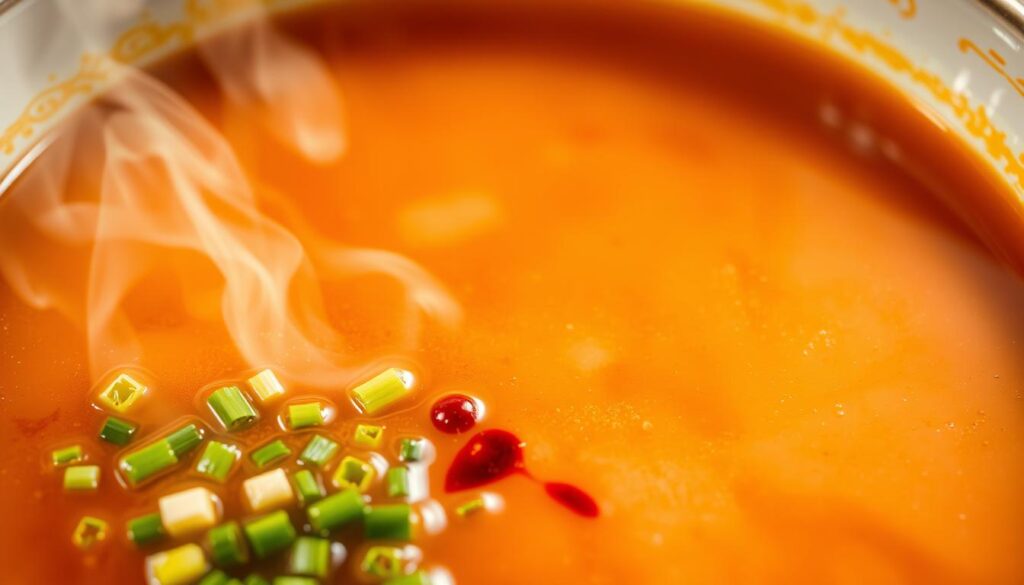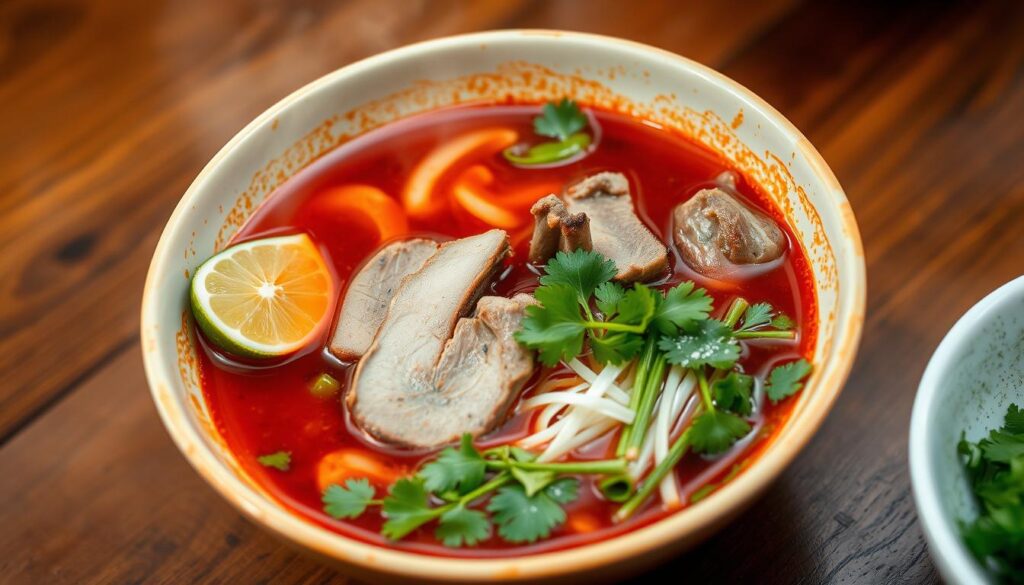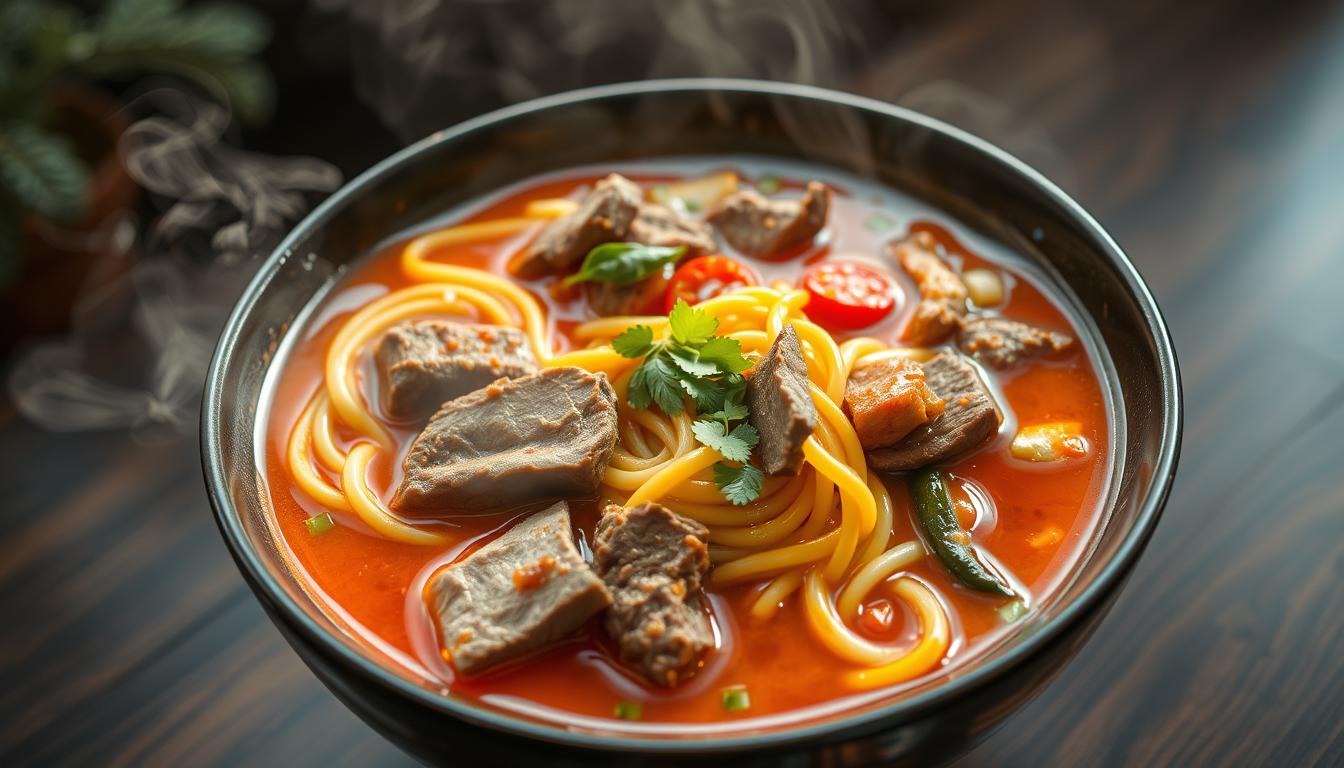Imagine a steaming bowl of aromatic, spicy noodle soup that warms your heart and soul. This beloved Vietnamese dish, bún bò Huế, is a vibrant blend of tender beef, pork, and fresh herbs in a rich, flavorful broth. Each sip and slurp transports you to the bustling streets of Huế, where tradition meets taste in every bowl.
Thank you for reading this post, don't forget to subscribe!What makes this recipe special? It’s the perfect harmony of slow-cooked broth, aromatic spices, and a variety of textures. Fresh lemongrass, garlic, and a touch of pineapple create a robust base, while carefully balanced seasonings add depth without overwhelming the senses. Compared to the popular phở, this dish stands out with its bold flavors and hearty ingredients, making it a hidden gem worth exploring.
Whether it’s a chilly evening or a cozy afternoon, this spicy noodle soup is more than just a meal—it’s a traditional culinary experience. With its rich history and cultural significance, every bowl tells a story. So, let’s dive into this recipe and uncover the layers that make it a true delight for your taste buds.
Key Takeaways
- Learn how to blend tender beef and pork into a spicy, aromatic noodle soup.
- Discover the importance of fresh ingredients like lemongrass and garlic.
- Explore the slow-cooked broth and its balanced seasoning.
- Understand why this dish stands out compared to other soups like phở.
- Experience the cultural significance of bún bò Huế in every bowl.
A Flavor-Packed Introduction
Step into the vibrant world of Vietnamese cuisine with a dish that captivates the senses. This lesser-known gem offers a bold and aromatic experience that will leave you wanting more.
Discovering a Vietnamese Classic
Bún bò Huế is a hidden treasure in Vietnamese cuisine, offering a rich and complex flavor profile. Unlike its more famous counterpart, pho, this dish stands out with its bold and spicy broth, made with a careful balance of ingredients like shrimp paste and pork blood.
The heart of this recipe lies in its broth, crafted in a large pot with fresh water and an array of aromatic spices. Each element, from the garlic to the oil, plays a crucial role in developing the deep, savory flavor that defines this soup.
Why This Recipe Stands Out
- A unique blend of pork and beef creates a hearty and satisfying texture.
- The traditional cooking method involves simmering the broth for hours to extract maximum flavor.
- Fresh herbs and spices add layers of complexity, making each bite a delightful experience.
This dish is more than just a meal; it’s a cultural experience that connects you to the traditions of Vietnam. With its rich history and bold flavors, bún bò Huế is a must-try for anyone looking to explore authentic Vietnamese cuisine.
Essentials of spicy beef & pork noodle soup
Discover the core elements that make this dish a standout in Vietnamese cuisine. The perfect blend of flavors and textures creates a memorable experience.
Understanding the Unique Broth
The broth is the heart of this recipe, requiring a slow-simmering process that can last from one hour to several. This extended cooking time extracts rich flavors from the meats and spices, creating a deep, savory base.

Fish sauce and other sauces play a crucial role in balancing the savory and spicy notes. The careful addition of these elements ensures the broth isn’t overwhelmed by heat, maintaining a harmonious flavor profile.
The Role of Beef and Pork in Vietnamese Cuisine
Using specific cuts of beef and pork adds layers of texture and flavor. This combination is a hallmark of Vietnamese culinary traditions, offering a hearty and satisfying experience.
The inclusion of both meats elevates the dish beyond typical soups, providing a complexity that delights the palate. Each bite showcases the richness of Vietnamese cuisine.
Key Ingredients and Preparation Tips
Creating an authentic Vietnamese noodle dish begins with selecting the right ingredients and mastering proper preparation techniques. Each component plays a vital role in achieving that perfect balance of flavors.
Selecting the Best Meats and Noodles
For an authentic experience, choose fresh, high-quality meats. Opt for beef shank and pork hocks, as they offer the ideal texture. Pair these with rice noodles, which provide a delicate contrast to the hearty meats.
When handling delicate ingredients like pork blood or banana blossom, ensure they are fresh and properly prepared. These elements add unique dimensions to the dish.
Mastering Aromatics, Herbs, and Spices
Aromatics like garlic and lemongrass form the foundation of the broth. Mince garlic finely and bruise lemongrass to release their flavors. Set aside these prepped ingredients to add later during cooking.
Spices and herbs are crucial. Measure sugar and lime juice carefully to balance the broth’s sour-sweet profile. Fish sauce enhances umami without overpowering the dish.
“The key to a great broth is in the bones. Simmer them patiently to extract every bit of flavor.”
Managing bones during cooking ensures a clean, flavorful broth. Regular skimming prevents impurities from affecting the taste. For added depth, simmer the bones longer to enhance the broth’s richness.
Preserve the freshness of herbs by adding them towards the end of cooking. This technique keeps their vibrant flavors intact, complementing the dish beautifully.
Step-by-Step Cooking Process
Mastering the art of cooking bun hue beef noodle soup involves a series of precise steps that ensure a flavorful and authentic result. This section will guide you through each stage, from prepping the ingredients to the final assembly of the dish.
Techniques for a Rich and Spicy Broth
The foundation of a great bun hue lies in its broth. Start by parboiling the meats to remove impurities, then simmer them for at least 1.5 hours. Add aromatics like garlic and lemongrass to the pot, ensuring they’re bruised to release their flavors fully. Skim the broth regularly to keep it clear and clean.

Balancing the broth is crucial. Use fish sauce and lime juice to adjust the savory and sour notes, creating a harmonious flavor profile that isn’t overwhelming.
Simmering, Timing, and Final Assembly
Once the broth is ready, focus on the final assembly. Cook the rice noodles according to package instructions, typically a brief 1-2 minute boil. Slice the meats into bite-sized pieces and layer them in a bowl with the noodles. Ladle the hot broth over the top, ensuring every piece of meat and noodle is well-coated.
Timing is everything. Simmer the oxtails for about 3.5 hours and the brisket for an additional 2 hours. This extended cooking time ensures the meats are tender and the broth is rich and flavorful.
Creating the Saté Spicy Chile Condiment
Elevate your dish with a homemade saté condiment. Combine lemongrass, shallots, garlic, and Thai chilies in a pan with oil. Cook until fragrant, then blend into a smooth paste. This condiment adds a bold, aromatic flavor that complements the broth perfectly.
Assemble your bun hue by layering meats, noodles, and herbs in a bowl. Pour the steaming broth over the top and serve immediately, allowing each bite to showcase the interplay of textures and flavors.
Customizing and Serving Your Vietnamese Noodle Soup
Transform your bowl of bún bò Huế into a personalized culinary experience. Whether you prefer a mild flavor or an extra spicy kick, this section will guide you on how to tailor the dish to your taste preferences and present it in an appealing way.
Adjusting Heat Levels to Suit Your Taste
One of the standout features of bún bò Huế is its customizable heat level. You can manage the spiciness by adjusting the amount of satế (spicy chili paste) added to your bowl. For a milder version, start with a small amount and add more to taste. If you prefer an extra spicy kick, generously drizzle the satế over your noodles and meats.
Presentation Tips and Creative Toppings
Presentation plays a significant role in making your bún bò Huế visually appealing. Start by layering your ingredients in a deep bowl—noodles at the bottom, followed by slices of beef and pork, and finally a generous ladle of steaming broth. Add fresh herbs like mint, basil, and bean sprouts for a pop of color and freshness.
For added texture and flavor, consider these creative toppings:
| Topping | Why It Works |
|---|---|
| Fresh Herbs | Enhances aroma and adds freshness |
| Bean Sprouts | Provides a satisfying crunch |
| Lime Wedges | Adds a tangy, citrusy note |
| Sambal Oelek | Introduces an intense chili flavor |
Pair your bún bò Huế with side condiments like sambal oelek and lime wedges for an extra burst of flavor. This approach ensures each bowl is both personalized and true to traditional flavors.
Conclusion
Embark on a culinary journey with this authentic spicy beef & pork noodle soup, a dish rich in history and flavor. By following the detailed steps and highlighting key ingredients like rice noodles and fresh vegetables, you can create a truly exceptional bowl.
The slow boil process and careful seasoning are crucial for achieving the perfect balance of flavors. Remember, this recipe is versatile—feel free to adjust the heat level or add your favorite toppings to make it your own.
We encourage you to experiment with this recipe and share your creations with friends and family. The combination of traditional ingredients and innovative techniques ensures a memorable dining experience. Happy cooking!
FAQ
How long does it take to prepare the broth for Vietnamese noodle soup?
What type of noodles are best for this recipe?
Can I use pre-made broth instead of making it from scratch?
How do I prevent the noodles from sticking together?
Can I customize the toppings for my noodle soup?
How do I store leftover noodle soup?
Source Links
- Bún Bò Huế Recipe – Spicy Vietnamese Beef & Pork Noodle Soup – https://www.hungryhuy.com/bun-bo-hue-recipe/
- Spicy Beef & Pork Noodle Soup- “Bun Bo Hue” Recipe — WHISKEY & BOOCH – https://www.whiskeyandbooch.com/blog/spicy-beef-amp-pork-noodle-soup-bun-bo-hue-recipe
- Authentic Thai Boat Noodles Recipe – https://hot-thai-kitchen.com/boat-noodles/
- Bún bò Huế (Spicy Vietnamese Beef Noodle Soup) – https://www.foodfaithfitness.com/bun-bo-hue-spicy-vietnamese-beef-noodle-soup/
- Bold and Spicy Caribbean Beef Noodle Soup Recipe Twist – https://www.justmaikacooking.com/recipes/bold-and-spicy-caribbean-beef-noodle-soup/
- Thai Beef Noodle Soup (Guay Tiew Nue Nam Sai) Recipe – https://www.mintsmeals.com/posts/thai-beef-noodle-soup-guay-tiew-nue-nam-sai-recipe
- Spicy Beef Noodles (Ready in 20 Minutes) – https://lenaskitchenblog.com/spicy-beef-noodles/
- Classic Thai Noodle Soup – Street Style – https://hot-thai-kitchen.com/classic-noodle-soup/
- Bún bò Huế – Vietnamese spicy beef noodle soup – https://takestwoeggs.com/bun-bo-hue-vietnamese-spicy-beef-noodle-soup/
- Quick and Easy Spicy Steak Ramen Noodle Soup Recipe – https://foodieholly.com/2025/01/07/quick-and-easy-spicy-steak-ramen-noodle-soup/
- Chinese Beef Noodle Soup – https://www.tasteofhome.com/recipes/chinese-beef-noodle-soup-recipe/?srsltid=AfmBOop2pcquLuHR1PwYpNNQFaVLmbhdMIady9P7AvwpeMBlGpGliUrt
- Taiwanese Beef Noodle Soup – Kwokspots – https://kwokspots.com/taiwanese-beef-noodle-soup/
- Bun Bo Hue: The Noodle Soup You Never Knew You Loved · i am a food blog – https://iamafoodblog.com/bun-bo-hue-recipe-the-spicy-vietnamese-noodle-soup-you-never-knew-you-loved/
- Spicy Beef Noodles – https://www.jocooks.com/recipes/spicy-beef-noodles/
- Vietnamese Pho (Homemade Broth!) – https://www.inspiredtaste.net/4307/vietnamese-soup-pho/
- Liu Shandong Beef Noodle Soup – The Best Bowl in all of Taiwan! – https://www.feastographyblog.com/blog/liu-shandong-beef-noodles-review
- Khao Soi: Thai Curry Noodle Soup – https://hot-thai-kitchen.com/kao-soi/
- Ultimate Qishan Saozi Noodles 2024 Guide – https://www.thestreetfoodguy.com/shaanxi-classics-qishan-saozi-noodles/


